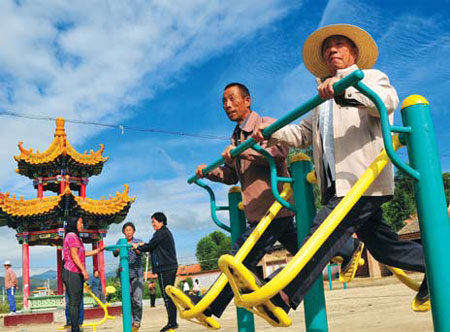Life improving in Laojing village, yet past draws tourists
 |
|
Local farming families try out new exercise equipment, part of provincial government initiatives to improve facilities in rural areas. Li Yi / for China Daily |
 |
|
Once-remote parts of Shanxi are now accessible by new roads built by the provincial government that not only facilitate better supplies and services, but also bring increasing numbers of tourists. Li Yi / for China Daily |
Nature is harsh in Laojing village, one of the poorest areas in Shanxi province. Founded at the foot of the Taihang Mountains, throughout most of its history it was not only an extreme, arid land - it was very hard to get to in the first place.
The village has 151 wells dug by hand by several generations over a hundred years in the quest for water. The desperate search cost dozens of lives.
A large project begun by provincial authorities in 2009 now provides tap water throughout rural Shanxi, but Laojing's wells remain crucial to the village - as a popular tourist draw that attracts visitors from large cities nationwide.
As it becomes increasingly modern, the past continues to set Laojing apart.
"Television, mobile phone service and land telephones are now accessible in the village, and we also have roads through to outside areas and running water to the houses," said a villager.
"But we receive more than 100 visitors at a time who want to stay in houses with stone walls and slate roofs, tasting local food and experiencing the history," he said.
Blossoming as a tourist destination in remote barren land, Laojing village is a success story in the provincial government's strenuous effort to improve the quality of life in rural areas.
Improvements have been made in education, health, transportation, cultural efforts and more social welfare benefits to rural residents.
The Shanxi government spent more than 60 billion yuan ($9.59 billion) since 2009 to repair school buildings and pave roads, as well as helping with the arrival of chain stores and improving cultural sites and fitness amenities.
This year, the government provided 10 preferential polices to farmers, including 3.1 billion yuan in agricultural subsidies, 2 billion yuan more than in 2011.
In addition to financial support, the government has promoted development and improved lives in rural areas by providing 500,000 jobs in the cities and towns and building 440,000 affordable housing units in 2011 alone.
The government is also providing a ton of free coal to each low-income rural household for heating in winter until 2015, benefiting nearly 7 million farmers.
haonan@chinadaily.com.cn














